 Skye Terrier is originated from United Kingdom but Yochon is originated from United States. Both Skye Terrier and Yochon are having almost same height. Skye Terrier may weigh 9 kg / 20 pounds more than Yochon. Both Skye Terrier and Yochon has almost same life span. Skye Terrier may have less litter size than Yochon. Both Skye Terrier and Yochon requires Moderate Maintenance.
Skye Terrier is originated from United Kingdom but Yochon is originated from United States. Both Skye Terrier and Yochon are having almost same height. Skye Terrier may weigh 9 kg / 20 pounds more than Yochon. Both Skye Terrier and Yochon has almost same life span. Skye Terrier may have less litter size than Yochon. Both Skye Terrier and Yochon requires Moderate Maintenance.
Basic Information
undefined
United Kingdom
United States
Life Span:
12 - 15 Years
10 - 14 Years
Other Names:
Skye
Bichyorkie • Borkie • Yo-Chon • Yochon • Yorki-Chon • Yorkichon • Yorkiechon • Yorkie-Chon • Yorkie-Bichon • Yorkshire Frise
Colors Available:
shades of grey, Fawn
Black, Blonde, Brown, Cream, Dark, Brown, Golden, Gray, White
Coat:
Long, straight, hard topcoat
silky or curly very full coat
Temperament:
Affectionate, Alert, Cheerful, Courageous, Curious, Docile, Energetic, Friendly, Gentle, Independent, Intelligent, Lively, Loving, Loyal, Outgoing, Playful, Quiet, Responsive, Social, Territorial
Alert, Energetic, Friendly, Independent, Intelligent, Loving, Playful
Grooming:
Moderate Maintenance
Moderate Maintenance
Trainability:
Easy
Moderate
New Owners Friendly:
Yes
Yes
History
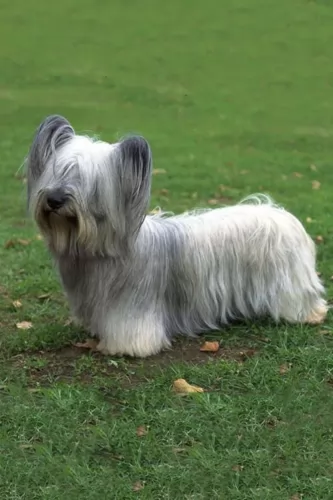 The Skye Terrier is a hardy dog breed and is actually considered to be an endangered native dog breed in the United Kingdom.
The Skye Terrier is a hardy dog breed and is actually considered to be an endangered native dog breed in the United Kingdom.
They were found on the Isle of Skye, although there is some confusion about its history. They were used long ago to hunt but these days they are essentially companion dogs.
They found their way to America and the Skye Terrier Club of America was founded in 1938. The American Kennel Club recognized the breed in 1887.
The Yochon is a “designer dog” – a cross between the Yorkshire Terrier and the Bichon Frise. They are not a purebred and are not recognized by purebred dog clubs such as the American Kennel Club (AKC). They are small, playful, families dogs. Most of them bear the best characteristics of each of their founding breeds, but because they are crossbreeds and most will be multi-generational cross breeds, there are no two dogs alike.
Though not recognized by the traditional purebred clubs they are recognized by several hybrid canine clubs. The cross was developed in the United States.
Description
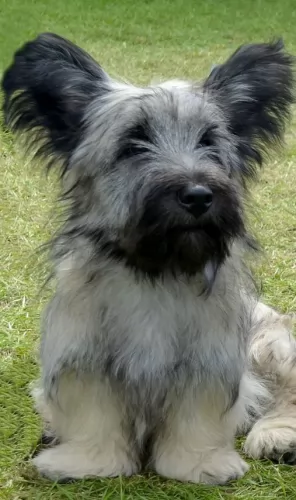 The Skye Terrier is a medium-sized dog standing at between 23 and 26cm in height and weighing between 12 and 18kg. The legs are short and sturdy. He is double coated with the top coat being straight and hard and forming a beard around the face area. The coat can be fawn, and in various shades of grey which are sometimes even black. The ears of the dog are medium sized and erect.
The Skye Terrier is a medium-sized dog standing at between 23 and 26cm in height and weighing between 12 and 18kg. The legs are short and sturdy. He is double coated with the top coat being straight and hard and forming a beard around the face area. The coat can be fawn, and in various shades of grey which are sometimes even black. The ears of the dog are medium sized and erect.
Temperament:
The Skye Terrier has always been a hunting dog and he enjoys quite a bit of exercise – walks, ball games as well as indoor games. Small though he may be, he is strong willed with a mind of his own and will benefit from being trained and socialized.
This is also necessary as he has a fairly reserved nature. He gets on well with children and makes an excellent family pet but he is ready to take on smaller pets in the home. He will bark when confronting strangers and makes an excellent watchdog too.
He is able to adapt well into life in the city or the countryside. He isn’t a dog to be left outside day after day and will just die of boredom, frustration and loneliness.
Yochons go by many different names but in general they are toy dogs, weighing in at under 20 pounds, most weighing 6-12 pounds. They have black noses, long tails, and round eyes. Their muzzles are blunt and their skulls are also round.
They have fluffy, full coats that can range from tan, to brown to black. They can also be white or cream. Their ears can be either hanging or erect.
Characteristics
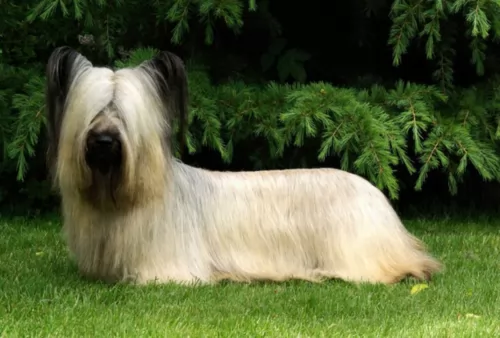 Give the Skye Terrier the attention he wants and he will reward you with his loving companionship.
Give the Skye Terrier the attention he wants and he will reward you with his loving companionship.
He loves the entire family but is best suited to homes where children have been taught to be kind to animals and to treat them with respect.
He has moderate energy levels and will expect you to give him a fair amount of exercise. The Skye Terrier can make an excellent companion for you and your family.
1 Children friendliness -yes very good but watch careful that children do not hurt them as they are so small and fragile.
2.Special talents – Loves families and playing
3.Adaptability – adapts well to apartments can play indoors
4.Learning ability – intelligent and independent
Health Problems
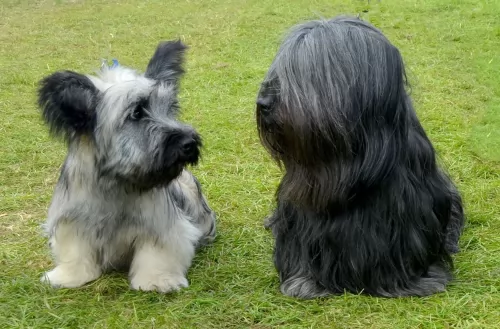 The Skye Terrier is a healthy dog breed. Perhaps the only issue that could be a problem with him is orthopedic problems. He is an achondroplastic dog, meaning a large body on small legs.
The Skye Terrier is a healthy dog breed. Perhaps the only issue that could be a problem with him is orthopedic problems. He is an achondroplastic dog, meaning a large body on small legs.
He could develop spinal problems if he were allowed to constantly be jumping off beds and high chairs.
Orthopedic problems affect the bones, muscles and joints and can actually be debilitating. Orthopedic conditions can be ligament tears or hip dysplasia for instance, accompanied by arthritis.
You’ll notice your dog has an abnormal way of walking or running, inability to get up once lying down and he may have arthritis and pain.Be careful because obesity can trigger problems with the joints and bones.
Both founding breeds are vulnerable to a few medical conditions. These include:
• Legg-Calve-Perthes Disease – insufficient blood to hind legs, thigh bones causing lameness.
• Patellar Luxation – slipped kneecaps can also cause lameness.
• Dental Issues – keep teeth brushed and cleaned.
• Hypothyroidism – can be treated with medication.
• Reverse Sneezing
• Allergies
• Collapsed Trachea due to small size – be careful with them at all times.
Caring The Pet
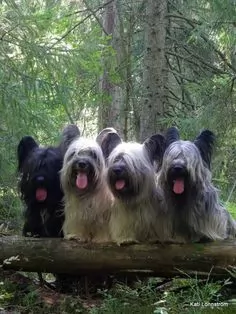 ● The coat of the Skye Terrier is long and silky and will most certainly require brushing every day if you keep the hair long. Such silky hair can easily become matted.
● The coat of the Skye Terrier is long and silky and will most certainly require brushing every day if you keep the hair long. Such silky hair can easily become matted.
● Little dogs like this will need their teeth being checked regularly. You can even try to buy special pet toothpaste and toothbrush and brush his teeth yourself. If you prefer, a professional dog groomer can do this for you and at the same time trim his nails and check his ears and clean the insides of the ears too to avoid infection.
● Provide him with his own warm, dry place to sleep.
● Don’t ignore his exercise needs. A dog without exercise will get sick.
● Provide him with top quality food as the quality of the dog food you buy makes a huge difference to his health and longevity. He is a small dog and there are some excellent commercially manufactured dog foods specially made for small, energetic dogs.
Try to include some home-made food for him which can be simply mixed into the dry kibble twice a week. Boiled chicken, brown rice or pasta and spinach, sweet potatoes and carrots is super tasty and nutritious. Ensure there is always a bowl of fresh, cool water within his reach.
● Have him neutered or spayed if you aren’t wanting puppies.
● Keep his vaccines up to date against some deadly canine diseases, and get him to the vet when he shows signs of illness.
● He isn't a large dog but will still need to be trained and socialized.
3.Feeding the puppy – do not overfeed. Use a high quality puppy toy breed kibble. Feed 3-4 X day.
2.Feeding the adult – do not overfeed. Use a high quality adult toy breed kibble. Feed at least twice a day.
3.Points for Good Health hearty/general good health and stamina
4. Games and Exercises does not need a lot of exercise . They enjoy obedience and agility trials.
Comparison with other breeds
- Yochon vs English Bulldog - Breed Comparison
- Yochon vs German Shepherd - Breed Comparison
- Yochon vs Golden Retriever - Breed Comparison
- Yochon vs Labrador Retriever - Breed Comparison
- Yochon vs West Highland White Terrier - Breed Comparison
- Yochon vs French Bulldog - Breed Comparison
- Yochon vs Beagle - Breed Comparison
- Yochon vs Yorkshire Terrier - Breed Comparison
- Yochon vs Poodle - Breed Comparison
- Yochon vs Rottweiler - Breed Comparison
- Yochon vs Boxer - Breed Comparison
- Yochon vs English Pointer - Breed Comparison
- Yochon vs Siberian Husky - Breed Comparison
- Yochon vs Doberman Pinscher - Breed Comparison
- Yochon vs American Bully - Breed Comparison
- Yochon vs Abruzzenhund - Breed Comparison
- Yochon vs Affenpinscher - Breed Comparison
- Yochon vs Afghan Hound - Breed Comparison
- Yochon vs Aidi - Breed Comparison
- Yochon vs Airedale Terrier - Breed Comparison
- Yochon vs Akbash Dog - Breed Comparison
- Yochon vs Akita - Breed Comparison
- Yochon vs Africanis - Breed Comparison
- Yochon vs Askal - Breed Comparison
- Yochon vs Atlas Terrier - Breed Comparison
- Skye Terrier vs English Bulldog - Breed Comparison
- Skye Terrier vs German Shepherd - Breed Comparison
- Skye Terrier vs Golden Retriever - Breed Comparison
- Skye Terrier vs Labrador Retriever - Breed Comparison
- Skye Terrier vs West Highland White Terrier - Breed Comparison
- Skye Terrier vs French Bulldog - Breed Comparison
- Skye Terrier vs Beagle - Breed Comparison
- Skye Terrier vs Yorkshire Terrier - Breed Comparison
- Skye Terrier vs Poodle - Breed Comparison
- Skye Terrier vs Rottweiler - Breed Comparison
- Skye Terrier vs Boxer - Breed Comparison
- Skye Terrier vs English Pointer - Breed Comparison
- Skye Terrier vs Siberian Husky - Breed Comparison
- Skye Terrier vs Doberman Pinscher - Breed Comparison
- Skye Terrier vs American Bully - Breed Comparison
- Skye Terrier vs Abruzzenhund - Breed Comparison
- Skye Terrier vs Affenpinscher - Breed Comparison
- Skye Terrier vs Afghan Hound - Breed Comparison
- Skye Terrier vs Aidi - Breed Comparison
- Skye Terrier vs Airedale Terrier - Breed Comparison
- Skye Terrier vs Akbash Dog - Breed Comparison
- Skye Terrier vs Akita - Breed Comparison
- Skye Terrier vs Africanis - Breed Comparison
- Skye Terrier vs Askal - Breed Comparison
- Skye Terrier vs Atlas Terrier - Breed Comparison
 Petzlover
Petzlover Skye Terrier is originated from United Kingdom but Yochon is originated from United States. Both Skye Terrier and Yochon are having almost same height. Skye Terrier may weigh 9 kg / 20 pounds more than Yochon. Both Skye Terrier and Yochon has almost same life span. Skye Terrier may have less litter size than Yochon. Both Skye Terrier and Yochon requires Moderate Maintenance.
Skye Terrier is originated from United Kingdom but Yochon is originated from United States. Both Skye Terrier and Yochon are having almost same height. Skye Terrier may weigh 9 kg / 20 pounds more than Yochon. Both Skye Terrier and Yochon has almost same life span. Skye Terrier may have less litter size than Yochon. Both Skye Terrier and Yochon requires Moderate Maintenance.  The Skye Terrier is a hardy dog breed and is actually considered to be an endangered native dog breed in the United Kingdom.
The Skye Terrier is a hardy dog breed and is actually considered to be an endangered native dog breed in the United Kingdom. The Skye Terrier is a medium-sized dog standing at between 23 and 26cm in height and weighing between 12 and 18kg. The legs are short and sturdy. He is double coated with the top coat being straight and hard and forming a beard around the face area. The coat can be fawn, and in various shades of grey which are sometimes even black. The ears of the dog are medium sized and erect.
The Skye Terrier is a medium-sized dog standing at between 23 and 26cm in height and weighing between 12 and 18kg. The legs are short and sturdy. He is double coated with the top coat being straight and hard and forming a beard around the face area. The coat can be fawn, and in various shades of grey which are sometimes even black. The ears of the dog are medium sized and erect. Give the Skye Terrier the attention he wants and he will reward you with his loving companionship.
Give the Skye Terrier the attention he wants and he will reward you with his loving companionship. The Skye Terrier is a healthy dog breed. Perhaps the only issue that could be a problem with him is orthopedic problems. He is an achondroplastic dog, meaning a large body on small legs.
The Skye Terrier is a healthy dog breed. Perhaps the only issue that could be a problem with him is orthopedic problems. He is an achondroplastic dog, meaning a large body on small legs. ● The coat of the Skye Terrier is long and silky and will most certainly require brushing every day if you keep the hair long. Such silky hair can easily become matted.
● The coat of the Skye Terrier is long and silky and will most certainly require brushing every day if you keep the hair long. Such silky hair can easily become matted.